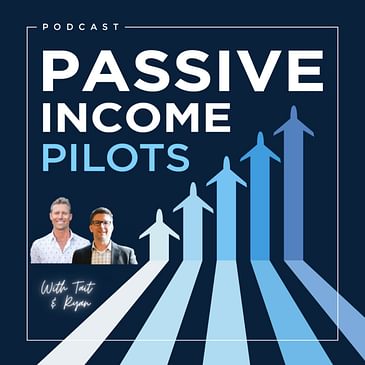Unlock the potential of 1031 exchanges with Kyle Williams, Senior VP at Velocity 1031, on this enlightening episode of Passive Income Pilots. Designed for aviators aiming to navigate the complex skies of real estate investment, this discussion sheds light on tax deferral strategies that can significantly impact your financial trajectory. Whether you're new to investing or looking to optimize your portfolio, this episode offers invaluable insights into maximizing your returns while minimizing tax liabilities. Engage with us, ask your burning questions, and propel your investments to new heights.
Timestamped Show Notes:
(00:00:00) Introduction to Financial Empowerment in Aviation
(00:02:43) Engaging Our Listeners
(00:03:14) Meet Kyle Williams
(00:04:35) Real-World Financial Solutions
(00:07:50) From Finance to Real Estate Mastery
(00:08:12) Unraveling 1031 Exchanges
(00:11:11) The Crucial First Steps in 1031 Exchanges
(00:12:26) Navigating the 45-Day Identification Window
(00:20:38) Enhancing Property Portfolios through 1031 Exchanges
(00:22:17) The Keystone Role of a Qualified Intermediary (QI)
(00:24:45) Mitigating Identification Period Pressures
(00:26:14) Extending Your Investment Horizon
(00:38:15) The Debt Replacement Strategy in 1031 Exchanges
(00:38:31) Mastering Partial Exchanges
(00:40:46) Your Next Steps with Kyle Williams
Resources Mentioned:
---You've found the number one resource for financial education for aviators! Please consider leaving a rating and sharing this podcast with your colleagues in the aviation community, as it can serve as a valuable resource for all those involved in the industry.
Remember to subscribe for more insights at PassiveIncomePilots.com!
Join our growing community on Facebook
Check us out on Instagram @PassiveIncomePilots
Follow us on X @IncomePilots
Get our updates on LinkedIn
Have questions or want to discuss this episode? Contact us at ask@passiveincomepilots.com See you on the next one!
Legal Disclaimer
The content of this podcast is provided solely for educational and informational purposes. The views and opinions expressed are those of the hosts, Tait Duryea and Ryan Gibson, and do not reflect those of any organization they are associated with, including Turbine Capital or Spartan Investment Group. The opinions of our guests are their own and should not be construed as financial advice. This podcast does not offer tax, legal, or investment advice. Listeners are advised to consult with their own legal or financial counsel and to conduct their own due diligence before making any financial decisions. The hosts, Tait Duryea and Ryan Gibson, do not necessarily endorse the views of the guests featured on the podcast, nor have the guests been comprehensively vetted by the hosts. Under no circumstances should any material presented in this podcast be used or considered as an offer to sell, or a solicitation of any offer to buy, an interest in any investment. Any potential offer or solicitation will be made exclusively through a Confidential Private Offering Memorandum related to the specific investment. Access to detailed information about the investments discussed is restricted to individuals who qualify as accredited investors under the Securities Act of 1933, as amended. Listeners are responsible for their own investment decisions and are encouraged to seek professional advice before investing.


